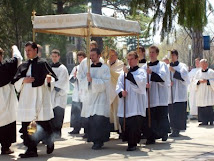
APOSTOLIC EXHORTATION
JOHN PAUL II
ON CATECHESIS IN OUR TIME
Catechesis as a Stage in Evangelization
18. Catechesis cannot be dissociated from the Church's pastoral and missionary activity as a whole. Nevertheless it has a specific character which was repeatedly the object of inquiry during the preparatory work and throughout the course of the fourth general assembly of the synod of Bishops. The question also interests the public both within and outside the Church. This is not the place for giving a rigorous formal definition of catechesis, which has been sufficiently explained in the General Catechetical Directory.(47) It is for specialists to clarify more and more its concept and divisions. In view of uncertainties in practice, let us simply recall the essential landmarks - they are already solidly established in Church documents - that are essential for an exact understanding of catechesis and without which there is a risk of failing to grasp its full meaning and import. All in all, it can be taken here that catechesis is an education of children, young people and adults in the faith, which includes especially the teaching of Christian doctrine imparted, generally speaking, in an organic and systematic way, with a view to initiating the hearers into the fullness of Christian life. Accordingly, while not being formally identified with them, catechesis is built on a certain number of elements of the Church's pastoral mission that have a catechetical aspect, that prepare for catechesis, or that spring from it. These elements are: the initial proclamation of the Gospel or missionary preaching through the kerygma to arouse faith, apologetics or examination of the reasons for belief, experience of Christian living, celebration of the sacraments, integration into the ecclesial community, and apostolic and missionary witness. Let us first of all recall that there is no separation or opposition between catechesis and evangelization. Nor can the two be simply identified with each other. Instead, they have close links whereby they integrate and complement each other.
The Apostolic Exhortation Evangelii nuntiandi of December 8, 1975, on evangelization in the modern world, rightly stressed that evangelization - which has the aim of bringing the Good News to the whole of humanity, so that all may live by it - is a rich, complex and dynamic reality, made up of elements, or one could say moments, that are essential and different from each other, and that must all be kept in view simultaneously.(48) Catechesis is one of these moments - a very remarkable one - in the whole process of evangelization.
Catechesis and the Initial Proclamation of the Gospel
19. The specific character of catechesis, as distinct from the initial conversion - bringing proclamation of the Gospel, has the twofold objective of maturing the initial faith and of educating the true disciple of Christ by means of a deeper and more systematic knowledge of the person and the message of our Lord Jesus Christ.(49) But in catechetical practice, this model order must allow for the fact that the initial evangelization has often not taken place. A certain number of children baptized in infancy come for catechesis in the parish without receiving any other initiation into the faith and still without any explicit personal attachment to Jesus Christ; they only have the capacity to believe placed within them by Baptism and the presence of the Holy Spirit; and opposition is quickly created by the prejudices of their non-Christian family background or of the positivist spirit of their education. In addition, there are other children who have not been baptized and whose parents agree only at a later date to religious education: for practical reasons, the catechumenal stage of these children will often be carried out largely in the course of the ordinary catechesis. Again, many pre-adolescents and adolescents who have been baptized and been given a systematic catechesis and the sacraments still remain hesitant for a long time about committing their whole lives to Jesus Christ - if, moreover, they do not attempt to avoid religious education in the name of their freedom. Finally, even adults are not safe from temptations to doubt or to abandon their faith, especially as a result of their unbelieving surroundings. This means that "catechesis" must often concern itself not only with nourishing and teaching the faith, but also with arousing it unceasingly with the help of grace, with opening the heart, with converting, and with preparing total adherence to Jesus Christ on the part of those who are still on the threshold of faith. This concern will in part decide the tone, the language and the method of catechesis.
Specific Aim of Catechesis
20. Nevertheless, the specific aim of catechesis is to develop, with God's help, an as yet initial faith, and to advance in fullness and to nourish day by day the Christian life of the faithful, young and old. It is in fact a matter of giving growth, at the level of knowledge and in life, to the seed of faith sown by the Holy Spirit with the initial proclamation and effectively transmitted by Baptism. Catechesis aims therefore at developing understanding of the mystery of Christ in the light of God's word, so that the whole of a person's humanity is impregnated by that word. Changed by the working of grace into a new creature, the Christian thus sets himself to follow Christ and learns more and more within the Church to think like Him, to judge like Him, to act in conformity with His commandments, and to hope as He invites us to. To put it more precisely: within the whole process of evangelization, the aim of catechesis is to be the teaching and maturation stage, that is to say, the period in which the Christian, having accepted by faith the person of Jesus Christ as the one Lord and having given Him complete adherence by sincere conversion of heart, endeavors to know better this Jesus to whom he has entrusted himself: to know His "mystery," the kingdom of God proclaimed by Him, the requirements and promises contained in His Gospel message, and the paths that He has laid down for anyone who wishes to follow Him. It is true that being a Christian means saying "yes" to Jesus Christ, but let us remember that this "yes" has two levels: It consists in surrendering to the word of God and relying on it, but it also means, at a later stage, endeavoring to know better - and better the profound meaning of this word.
Need for Systematic Catechesis
21. In his closing speech at the fourth general assembly of the synod, Pope Paul VI rejoiced "to see how everyone drew attention to the absolute need for systematic catechesis, precisely because it is this reflective study of the Christian mystery that fundamentally distinguishes catechesis from all other ways of presenting the word of God."(50)
In view of practical difficulties, attention must be drawn to some of the characteristics of this instruction:
-It must be systematic, not improvised but programmed to reach a precise goal;
-It must deal with essentials, without any claim to tackle all disputed questions or to transform itself into theological research or scientific exegesis;
-It must nevertheless be sufficiently complete, not stopping short at the initial proclamation of the Christian mystery such as we have in the kerygma;
-It must be an integral Christian initiation, open to all the other factors of Christian life.
I am not forgetting the interest of the many different occasions for catechesis connected with personal, family, social and ecclesial life - these occasions must be utilized and I shall return to them in Chapter VI - but I am stressing the need for organic and systematic Christian instruction, because of the tendency in various quarters to minimize its importance.
Catechesis and Life Experience
22. It is useless to play off orthopraxis against orthodoxy: Christianity is inseparably both. Firm and well-thought - out convictions lead to courageous and upright action, the endeavor to educate the faithful to live as disciples of Christ today calls for and facilitates a discovery in depth of the mystery of Christ in the history of salvation. It is also quite useless to campaign for the abandonment of serious and orderly study of the message of Christ in the name of a method concentrating on life experience. "No one can arrive at the whole truth on the basis solely of some simple private experience, that is to say, without an adequate explanation of the message of Christ, who is `the way, and the truth, and the life' (Jn. 14:6)."(51) Nor is any opposition to be set up between a catechesis taking life as its point of departure and a traditional doctrinal and systematic catechesis.(52) Authentic catechesis is always an orderly and systematic initiation into the revelation that God has given of Himself to humanity in Christ Jesus, a revelation stored in the depths of the Church's memory and in Sacred Scripture, and constantly communicated from one generation to the next by a living, active traditio. This revelation is not however isolated from life or artificially juxtaposed to it. It is concerned with the ultimate meaning of life and it illumines the whole of life with the light of the Gospel, to inspire it or to question it.
That is why we can apply to catechists an expression used by the Second Vatican Council with special reference to priests: "Instructors (of the human being and his life) in the faith."(53)
Catechesis and Sacraments
23. Catechesis is intrinsically linked with the whole of liturgical and sacramental activity, for it is in the sacraments, especially in the Eucharist, that Christ Jesus works in fullness for the transformation of human beings. In the early Church, the catechumenate and preparation for the sacraments of Baptism and the Eucharist were the same thing. Although in the countries that have long been Christian the Church has changed her practice in this field, the catechumenate has never been abolished; on the contrary, it is experiencing a renewal in those countries(54) and is abundantly practiced in the young missionary Churches. In any case, catechesis always has reference to the sacraments. On the one hand, the catechesis that prepares for the sacraments is an eminent kind, and every form of catechesis necessarily leads to the sacraments of faith. On the other hand, authentic practice of the sacraments is bound to have a catechetical aspect. In other words, sacramental life is impoverished and very soon turns into hollow ritualism if it is not based on serious knowledge of the meaning of the sacraments, and catechesis becomes intellectualized if it fails to come alive in the sacramental practice.
Catechesis and Ecclesial Community
24. Finally, catechesis is closely linked with the responsible activity of the Church and of
Christians in the world. A person who has given adherence to Jesus Christ by faith and is endeavoring to consolidate that faith by catechesis needs to live in communion with those who have taken the same step. Catechesis runs the risk of becoming barren if no community of faith and Christian life takes the catechumen in at a certain stage of his catechesis. That is why the ecclesial community at all levels has a twofold responsibility with regard to catechesis: it has the responsibility of providing for the training of its members, but it also has the responsibility of welcoming them into an environment where they can live as fully as possible what they have learned. Catechesis is likewise open to missionary dynamism. If catechesis is done well, Christians will be eager to bear witness to their faith, to hand it on to their children, to make it known to others, and to serve the human community in every way.
Catechesis in the Wide Sense Necessary for Maturity and Strength of Faith
25. Thus through catechesis the Gospel kerygma (the initial ardent proclamation by which a person is one day overwhelmed and brought to the decision to entrust himself to Jesus Christ by faith) is gradually deepened, developed in its implicit consequences, explained in language that includes an appeal to reason, and channelled towards Christian practice in the Church and the world. All this is no less evangelical than the kerygma, in spite of what is said by certain people who consider that catechesis necessarily rationalizes, dries up and eventually kills all that is living, spontaneous and vibrant in the kerygma. The truths studied in catechesis are the same truths that touched the person's heart when he heard them for the first time. Far from blunting or exhausting them, the fact of knowing them better should make them even more challenging and decisive for one's life. In the understanding expounded here, catechesis keeps the entirely pastoral perspective with which the synod viewed it. This broad meaning of catechesis in no way contradicts but rather includes and goes beyond a narrow meaning which was once commonly given to catechesis in didactic expositions, namely, the simple teaching of the formulas that express faith. In the final analysis, catechesis is necessary both for the maturation of the faith of Christians and for their witness in the world: It is aimed at bringing Christians to "attain to the unity of the faith and of the knowledge of the Son of God, to mature manhood, to the measure of the stature of the fullness of Christ"(55); it is also aimed at making them prepared to make a defense to anyone who calls them to account for the hope that is in them.(56)
19. The specific character of catechesis, as distinct from the initial conversion - bringing proclamation of the Gospel, has the twofold objective of maturing the initial faith and of educating the true disciple of Christ by means of a deeper and more systematic knowledge of the person and the message of our Lord Jesus Christ.(49) But in catechetical practice, this model order must allow for the fact that the initial evangelization has often not taken place. A certain number of children baptized in infancy come for catechesis in the parish without receiving any other initiation into the faith and still without any explicit personal attachment to Jesus Christ; they only have the capacity to believe placed within them by Baptism and the presence of the Holy Spirit; and opposition is quickly created by the prejudices of their non-Christian family background or of the positivist spirit of their education. In addition, there are other children who have not been baptized and whose parents agree only at a later date to religious education: for practical reasons, the catechumenal stage of these children will often be carried out largely in the course of the ordinary catechesis. Again, many pre-adolescents and adolescents who have been baptized and been given a systematic catechesis and the sacraments still remain hesitant for a long time about committing their whole lives to Jesus Christ - if, moreover, they do not attempt to avoid religious education in the name of their freedom. Finally, even adults are not safe from temptations to doubt or to abandon their faith, especially as a result of their unbelieving surroundings. This means that "catechesis" must often concern itself not only with nourishing and teaching the faith, but also with arousing it unceasingly with the help of grace, with opening the heart, with converting, and with preparing total adherence to Jesus Christ on the part of those who are still on the threshold of faith. This concern will in part decide the tone, the language and the method of catechesis.
Specific Aim of Catechesis
20. Nevertheless, the specific aim of catechesis is to develop, with God's help, an as yet initial faith, and to advance in fullness and to nourish day by day the Christian life of the faithful, young and old. It is in fact a matter of giving growth, at the level of knowledge and in life, to the seed of faith sown by the Holy Spirit with the initial proclamation and effectively transmitted by Baptism. Catechesis aims therefore at developing understanding of the mystery of Christ in the light of God's word, so that the whole of a person's humanity is impregnated by that word. Changed by the working of grace into a new creature, the Christian thus sets himself to follow Christ and learns more and more within the Church to think like Him, to judge like Him, to act in conformity with His commandments, and to hope as He invites us to. To put it more precisely: within the whole process of evangelization, the aim of catechesis is to be the teaching and maturation stage, that is to say, the period in which the Christian, having accepted by faith the person of Jesus Christ as the one Lord and having given Him complete adherence by sincere conversion of heart, endeavors to know better this Jesus to whom he has entrusted himself: to know His "mystery," the kingdom of God proclaimed by Him, the requirements and promises contained in His Gospel message, and the paths that He has laid down for anyone who wishes to follow Him. It is true that being a Christian means saying "yes" to Jesus Christ, but let us remember that this "yes" has two levels: It consists in surrendering to the word of God and relying on it, but it also means, at a later stage, endeavoring to know better - and better the profound meaning of this word.
Need for Systematic Catechesis
21. In his closing speech at the fourth general assembly of the synod, Pope Paul VI rejoiced "to see how everyone drew attention to the absolute need for systematic catechesis, precisely because it is this reflective study of the Christian mystery that fundamentally distinguishes catechesis from all other ways of presenting the word of God."(50)
In view of practical difficulties, attention must be drawn to some of the characteristics of this instruction:
-It must be systematic, not improvised but programmed to reach a precise goal;
-It must deal with essentials, without any claim to tackle all disputed questions or to transform itself into theological research or scientific exegesis;
-It must nevertheless be sufficiently complete, not stopping short at the initial proclamation of the Christian mystery such as we have in the kerygma;
-It must be an integral Christian initiation, open to all the other factors of Christian life.
I am not forgetting the interest of the many different occasions for catechesis connected with personal, family, social and ecclesial life - these occasions must be utilized and I shall return to them in Chapter VI - but I am stressing the need for organic and systematic Christian instruction, because of the tendency in various quarters to minimize its importance.
Catechesis and Life Experience
22. It is useless to play off orthopraxis against orthodoxy: Christianity is inseparably both. Firm and well-thought - out convictions lead to courageous and upright action, the endeavor to educate the faithful to live as disciples of Christ today calls for and facilitates a discovery in depth of the mystery of Christ in the history of salvation. It is also quite useless to campaign for the abandonment of serious and orderly study of the message of Christ in the name of a method concentrating on life experience. "No one can arrive at the whole truth on the basis solely of some simple private experience, that is to say, without an adequate explanation of the message of Christ, who is `the way, and the truth, and the life' (Jn. 14:6)."(51) Nor is any opposition to be set up between a catechesis taking life as its point of departure and a traditional doctrinal and systematic catechesis.(52) Authentic catechesis is always an orderly and systematic initiation into the revelation that God has given of Himself to humanity in Christ Jesus, a revelation stored in the depths of the Church's memory and in Sacred Scripture, and constantly communicated from one generation to the next by a living, active traditio. This revelation is not however isolated from life or artificially juxtaposed to it. It is concerned with the ultimate meaning of life and it illumines the whole of life with the light of the Gospel, to inspire it or to question it.
That is why we can apply to catechists an expression used by the Second Vatican Council with special reference to priests: "Instructors (of the human being and his life) in the faith."(53)
Catechesis and Sacraments
23. Catechesis is intrinsically linked with the whole of liturgical and sacramental activity, for it is in the sacraments, especially in the Eucharist, that Christ Jesus works in fullness for the transformation of human beings. In the early Church, the catechumenate and preparation for the sacraments of Baptism and the Eucharist were the same thing. Although in the countries that have long been Christian the Church has changed her practice in this field, the catechumenate has never been abolished; on the contrary, it is experiencing a renewal in those countries(54) and is abundantly practiced in the young missionary Churches. In any case, catechesis always has reference to the sacraments. On the one hand, the catechesis that prepares for the sacraments is an eminent kind, and every form of catechesis necessarily leads to the sacraments of faith. On the other hand, authentic practice of the sacraments is bound to have a catechetical aspect. In other words, sacramental life is impoverished and very soon turns into hollow ritualism if it is not based on serious knowledge of the meaning of the sacraments, and catechesis becomes intellectualized if it fails to come alive in the sacramental practice.
Catechesis and Ecclesial Community
24. Finally, catechesis is closely linked with the responsible activity of the Church and of
Christians in the world. A person who has given adherence to Jesus Christ by faith and is endeavoring to consolidate that faith by catechesis needs to live in communion with those who have taken the same step. Catechesis runs the risk of becoming barren if no community of faith and Christian life takes the catechumen in at a certain stage of his catechesis. That is why the ecclesial community at all levels has a twofold responsibility with regard to catechesis: it has the responsibility of providing for the training of its members, but it also has the responsibility of welcoming them into an environment where they can live as fully as possible what they have learned. Catechesis is likewise open to missionary dynamism. If catechesis is done well, Christians will be eager to bear witness to their faith, to hand it on to their children, to make it known to others, and to serve the human community in every way.
Catechesis in the Wide Sense Necessary for Maturity and Strength of Faith
25. Thus through catechesis the Gospel kerygma (the initial ardent proclamation by which a person is one day overwhelmed and brought to the decision to entrust himself to Jesus Christ by faith) is gradually deepened, developed in its implicit consequences, explained in language that includes an appeal to reason, and channelled towards Christian practice in the Church and the world. All this is no less evangelical than the kerygma, in spite of what is said by certain people who consider that catechesis necessarily rationalizes, dries up and eventually kills all that is living, spontaneous and vibrant in the kerygma. The truths studied in catechesis are the same truths that touched the person's heart when he heard them for the first time. Far from blunting or exhausting them, the fact of knowing them better should make them even more challenging and decisive for one's life. In the understanding expounded here, catechesis keeps the entirely pastoral perspective with which the synod viewed it. This broad meaning of catechesis in no way contradicts but rather includes and goes beyond a narrow meaning which was once commonly given to catechesis in didactic expositions, namely, the simple teaching of the formulas that express faith. In the final analysis, catechesis is necessary both for the maturation of the faith of Christians and for their witness in the world: It is aimed at bringing Christians to "attain to the unity of the faith and of the knowledge of the Son of God, to mature manhood, to the measure of the stature of the fullness of Christ"(55); it is also aimed at making them prepared to make a defense to anyone who calls them to account for the hope that is in them.(56)




































No comments:
Post a Comment